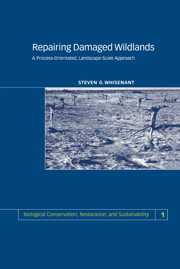Book contents
- Frontmatter
- Contents
- Preface
- Acknowledgments
- 1 Wildland degradation and repair
- 2 Assessing damage to primary processes
- 3 Repairing damaged primary processes
- 4 Directing vegetation change
- 5 Selecting plant materials
- 6 Site preparation and seedbed management
- 7 Planting
- 8 Planning repair programs for wildland landscapes
- Literature cited
- Index
2 - Assessing damage to primary processes
Published online by Cambridge University Press: 03 December 2009
- Frontmatter
- Contents
- Preface
- Acknowledgments
- 1 Wildland degradation and repair
- 2 Assessing damage to primary processes
- 3 Repairing damaged primary processes
- 4 Directing vegetation change
- 5 Selecting plant materials
- 6 Site preparation and seedbed management
- 7 Planting
- 8 Planning repair programs for wildland landscapes
- Literature cited
- Index
Summary
Introduction
Wildland ecosystems are biogeochemical systems that use solar energy to convert low-energy inorganic compounds into high-energy organic compounds. Healthy ecosystems use these organic materials to exert and maintain biotic control over flows of soil, water, nutrients, and organic materials (Chapin et al., 1997). Degraded ecosystems, with damaged biotic components, have diminished control over limiting resources (Davenport et al., 1998). In the absence of biotic controls, flows of limiting resources through wildland landscapes are only affected by landform and microtopographic features. A wildland is fully functional when its previous rate of energy capture has been restored, nutrient export has been minimized, and hydrologic processes are properly functioning (Breedlow et al., 1988).
Ecosystems have unique combinations of processes that contribute to proper functioning. Thus, no single assessment is appropriate for all circumstances and management objectives. Criteria that involve the conservation of limiting resources and the functioning of essential primary processes deserve priority status. Since surface soil condition assessments provide insight into stability (ability to withstand erosive forces), hydrologic processes (infiltration and runoff), and nutrient cycling, they provide a useful focal point for repair efforts.
There is ample evidence that replacing species or depleted materials, without repairing damaged primary processes, does not necessarily lead to healthy, self-regulating ecosystems. Our emphasis on function rather than structure requires a focus on the movements of limiting resources (soil, water, nutrients, and organic materials) rather than their abundance. This emphasis on the flows of limiting resources has theoretical support (Finn, 1976) and is a basic tenet of ecological engineering, where external inputs (i.e., forcing functions) are manipulated to direct ecosystem change.
- Type
- Chapter
- Information
- Repairing Damaged WildlandsA Process-Orientated, Landscape-Scale Approach, pp. 24 - 63Publisher: Cambridge University PressPrint publication year: 1999



